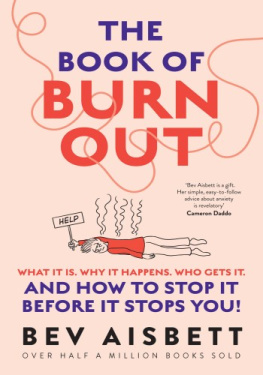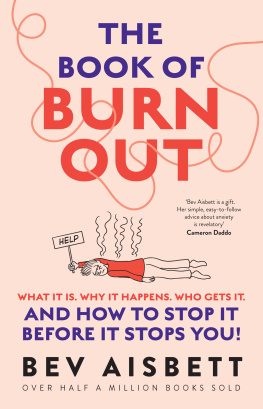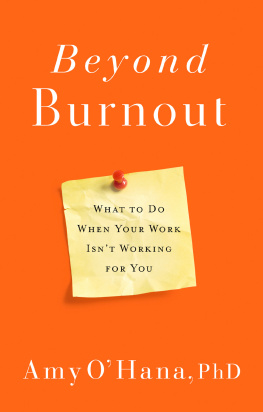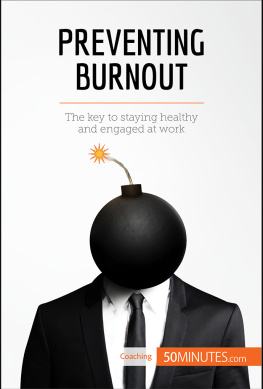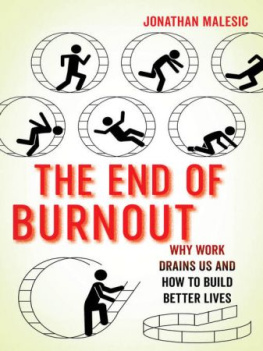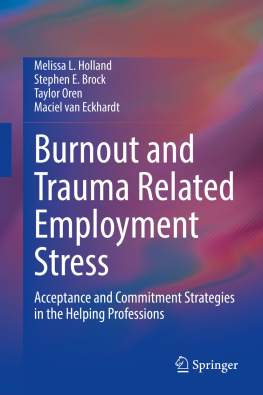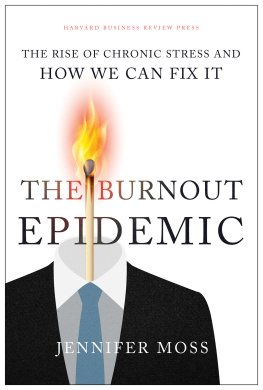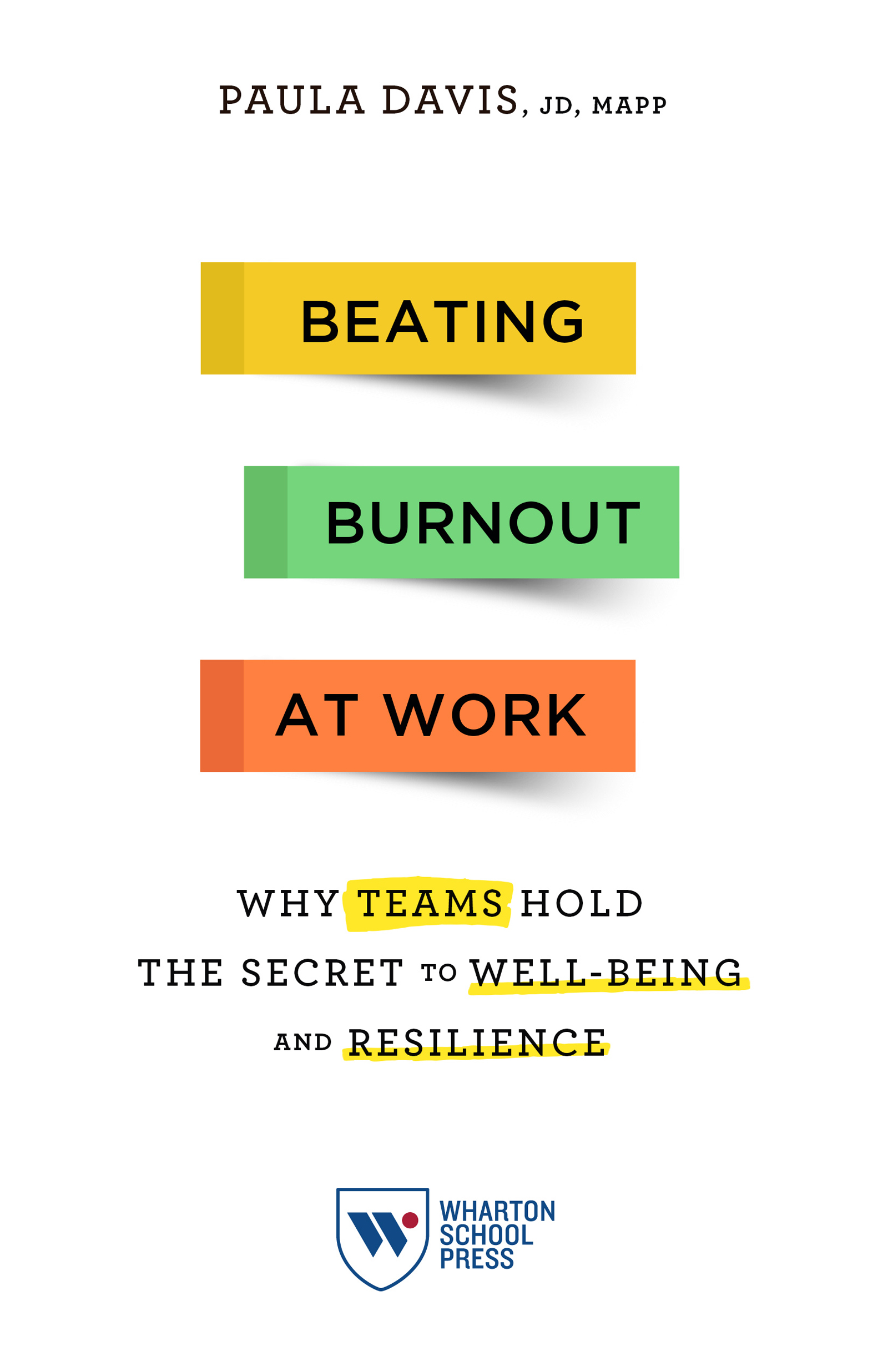All rights reserved. No part of this book may be reproduced, in any form or by any means, without written permission of the publisher. Company and product names mentioned herein are the trademarks or registered trademarks of their respective owners.
Introduction
Why did you decide to leave your law practice? How did you have the courage to change careers? You did what? These are the questions I am most frequently asked, and I always smile at them. I have been researching, teaching, and talking about burnout, resilience, and well-being for the last 10 years, but I didnt intend for that to be my career path. I burned out during what became the last year of my law practice. My decision to change careers turned out to be an easy one because I was on the verge of a breakdown.
My burnout story starts in 2008. If you met me then, you would have seen a successful lawyer, on top of her game, closing several complex multimillion dollar commercial real estate deals each month. You may have even thought, She has it all. But heres what you would have missed. I was physically and emotionally exhausted, and it was a different kind of tired than I had ever experienced. Getting out of bed to go to work had become exceedingly difficult, if not emotionally painful. One day when I was walking my golden retriever, Sadie, I closed my eyes briefly, mindful of the warm sun on my face. I woke to a wet nose nudging my handI had fallen asleep standing on the side of the road, holding her leash. When I wasnt working, I neglected friendships in favor of bad reality television. Every work or life curveball, no matter how minor, became major. While I was driving to my parents house one day, my mom called asking if I would stop at the grocery store on my way. I had a level-15 reaction to her very basic request. It alarmed her so much that she hugged me when I got the house and asked me if I was OK. That was not my personality, and it was a red flag.
I had also become very cynical, even by lawyer standards. Each morning, I would walk into work and dart directly into my office, hoping that the pressures of the day would stay away as long as possible. When my clients asked about a legal issue, outwardly I was very professional. But inwardly, I would roll my eyes and think, Really? You cant handle this on your own? Didnt we already talk about this? Does the world really need another mini-mall? My job as a commercial real estate lawyer was to help developers sort through legal issues so that they could build mini-mallsI had to be on board with the concept. Disconnecting from people was unusual for me, and I just wanted to be left alone.
Eventually, I started to feel ineffective. I never lost confidence in my ability to be a good lawyer, but I started to think, Why bother? and Who cares? In conversations with clients, my inner dialogue would be, Youre not going to listen to my advice anyway, so why are we having this conversation? I also stopped seeing a clear path for myself through the legal profession. I worked at a large law firm and then in-house in a corporate legal department. I had checked the progression boxes that other people told me mattered in my career, and it wasnt enough.
My burnout was severe, but it didnt start that way. It was a slow burn. I started going into work later most days, just an extra 10 minutes so that nobody would notice. Over time, I stopped having as many lunches, coffees, and conversations with my business clients and colleagues. When burnout progresses, it can feel as though youre trapped inside a box. I tried several ways to escape. My boss, Steve, actually cared; I told him how I felt. I didnt give him the whole story, I just told him that I wanted to work on other types of projects in the legal department. I positioned it as good for my career to get more expertise in other areas. He was OK with having me do fewer real estate deals, but senior leadership was not. I also thought very seriously about going back to the law firm where I used to work. Had it not been for a #MeToo moment I experienced right before my departure, I probably would have returned to work there.
I didnt want to start over at another firm, so I decided to start my own business. My parents owned a business for 15 years, and I grew up in an entrepreneurial world. I knew that business ownership would be in the cards for me at some point, though I thought it would be much later in life. I decided to start a bakery and was accepted to a pastry school in New York City. I spent hours dreaming about school, the recipes I would develop, and the certainty of an eventual James Beard Award. I even landed a short internship at a hip and trendy restaurant in San Francisco near where my brother lived, and I used a week of vacation to go there and work. I was so certain of my future that I gave Steve my notice before leaving for San Francisco.
Do you see where this is going? I knew within hours of starting the internship that I had made a mistake. Working in a restaurant is grueling work. The long hours, standing on your feet all day, producing the same desserts somebody else invented was not for me. It felt nothing like the dream I had envisioned. But I had a bigger problem: saving my job! I called Steve as soon as work ended and explained the situation. He was very understanding, excited to have me return to the job nobody knew I left. I wish everybody a boss like Steve.
Although I was thankful to still have a job, I was back at square one. My burnout worsened and along with it came high levels of anxiety. As a result, I started to get panic attacks that came weekly, sometimes daily. In addition, the high levels of stress caused such severe stomachaches that I ended up in the emergency room twice. I saw more than a half-dozen doctors. None of them mentioned burnout or work or even asked how I was doing generally in life. I was at a point where, if someone had asked me how I was doing, I would have burst into tears. This would have revealed the truth I had been keeping a secret because I didnt want to be perceived as a weak lawyer who couldnt hack it.
My last day practicing law was June 24, 2009. A few months before that, I stumbled on an article that described exactly how I felt. Until that point, I had not really known what burnout was, how it started, or why it had crept up on me. At that moment, though, I knew studying it was my path forward.
Recovering from burnout, interviewing others about their burnout experiences, coaching clients, teaching and training thousands of people, and studying the evolving and increasingly pervasive research have informed what I know burnout to be and, importantly, how it is prevented.
My dedication to helping other people led me eventually to create the Stress & Resilience Institute, where we focus on building practical strategies for companies who want to lessen the effects of burnout on their employees and build a more resilient, thriving, and engaged workplace.


